What we learn together
Thank You: “Words that Bless”
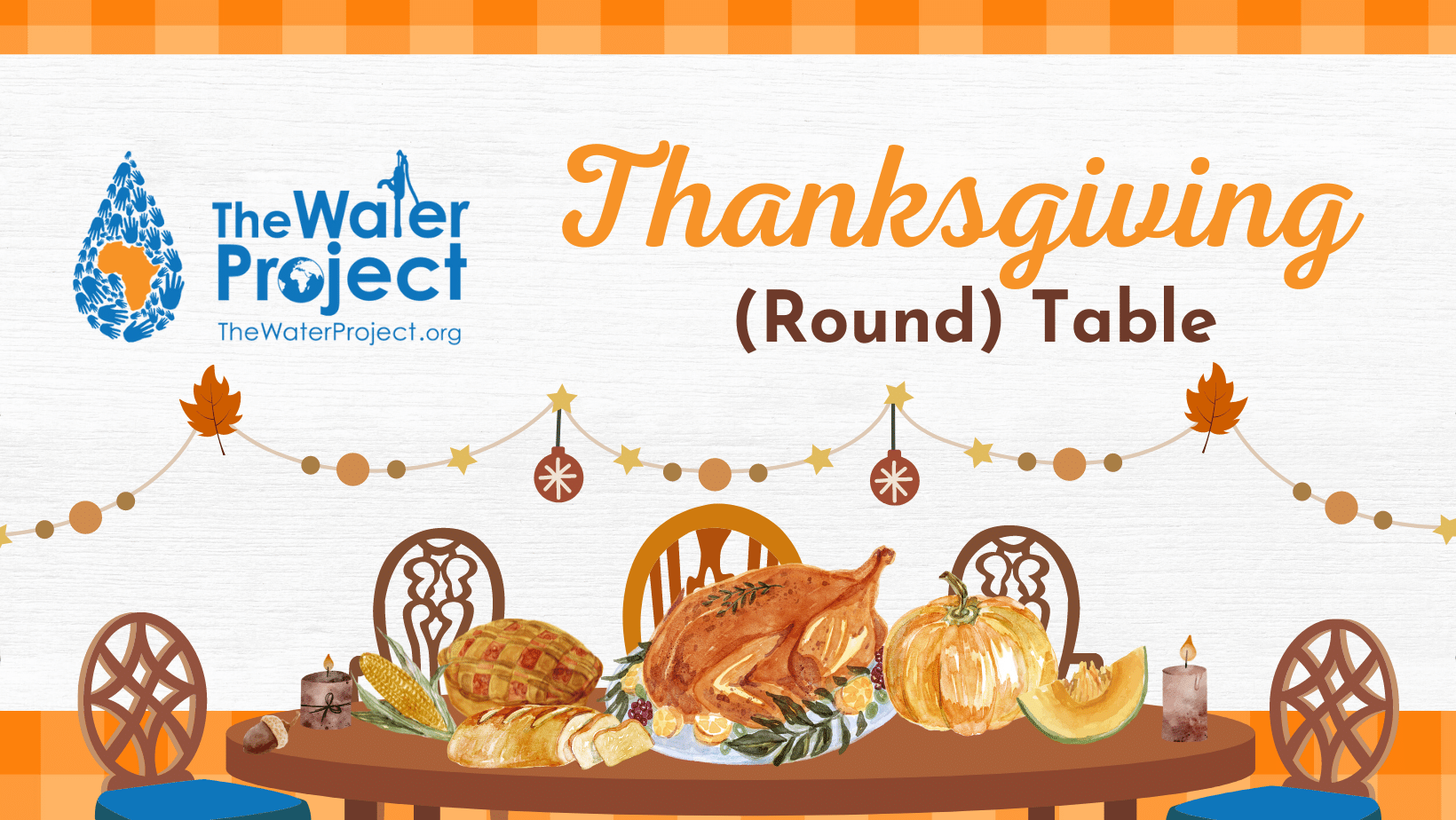 By Sam Ngidiwe and Jamie Heminway
By Sam Ngidiwe and Jamie Heminway
Our founder, Peter Chasse, uses a table metaphor to explain all the players involved in getting reliable water to those who need it most. Each group – including our donors – has its own spot at a round table, with equal investments on all fronts. It’s only through balanced teamwork that we can accomplish so much and continue growing each year.
We staff members are so thankful for everyone who contributes to each water project. But we find, while battling the everyday challenges of providing clean water, everyone involved ends up feeling grateful to be a part of this life-giving mission. With each school, community, or health facility transformed with the power of life-giving water, our collaborators’ hearts fill with gratitude alongside those of the people we help.
We’re grateful to be surrounded by so many glowing examples of humanity. Behind The Water Project (TWP) scenes are innovative, compassionate people blazing new trails through and around every obstacle. This Thanksgiving, we thought we’d give a few of them the opportunity to share what “thank you” means to them.
What is your perspective on the phrase “thank you”?
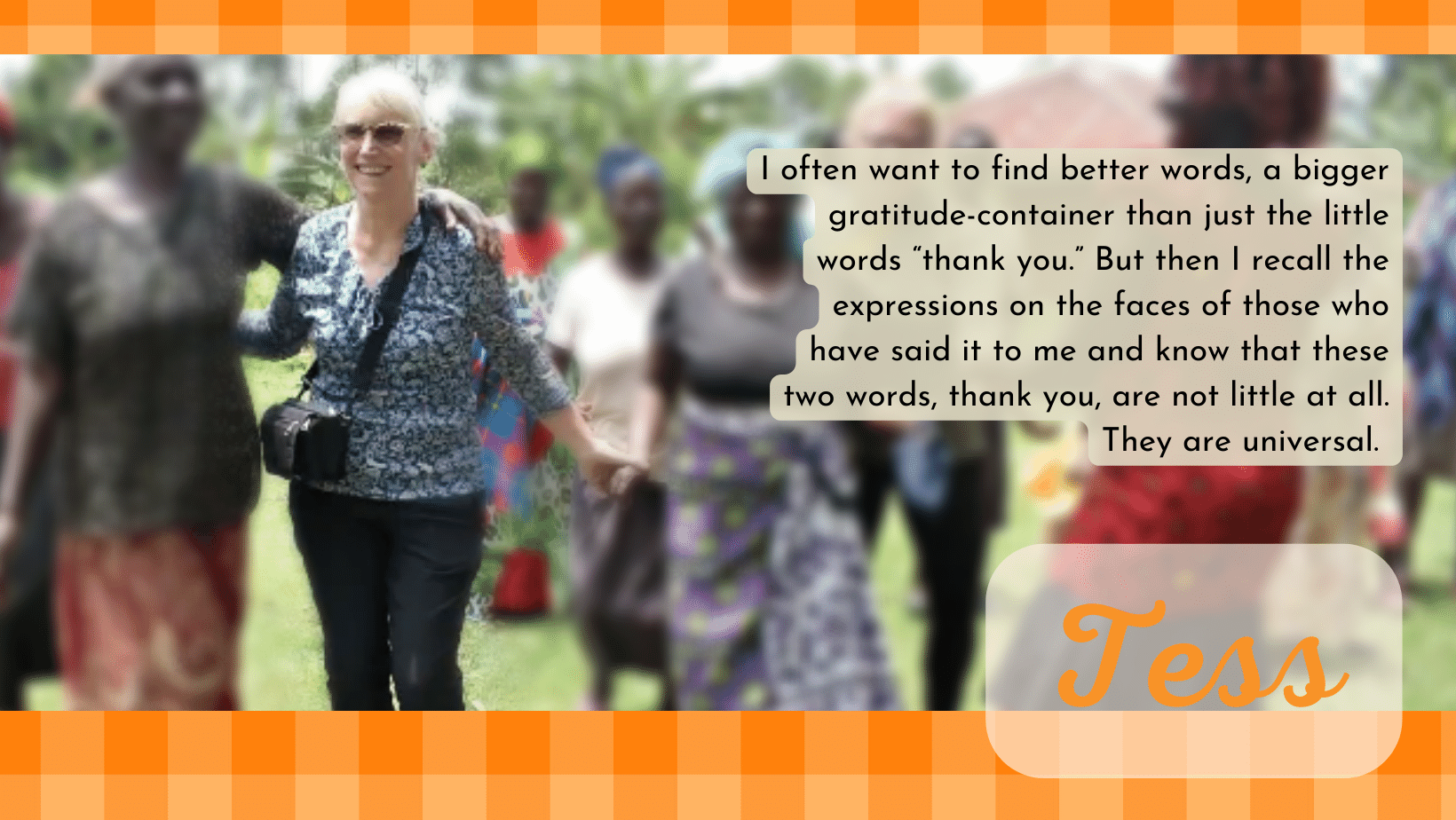
Catherine Chepkomoi, Executive Director in Vihiga counties of Kenya: My perspective of the phrase thank you is an inward appreciation to somebody or someone who has done something good worth remembering. It is a feeling that normally comes automatically when one is expressing gratitude, feeling satisfied or relieved, acknowledging a gift or a service.
Emmah Nambuye Luvinzu, Executive Director in Mumias East and Kakamega counties of Kenya: My perspective of the word thank you is a word said as an expression of gratitude to someone or something good that has happened to you.
Humphrey Buradi Zadock, Director of TWP’s Regional Service Hub: In my honest opinion, the phrase “thank you” is used to tell someone that you are grateful because the person has given you something or done something for you that you didn’t expect. In Kiswahili, that [translates to] Asante.
In other words, it is an expression of gratitude or politeness in response to something done or given to the one saying “thank you.”
Lastly, saying thank you also means that you are grateful for the things that happened to you as a result of someone else’s effort. A good example is the gift of water that we get in Western Kenya as a result of the support we get from TWP.
Spencer Bogle, Director of Program: I believe that life is a gift and that gratitude is a natural response to receiving a gift. There is always something to be thankful for if we have eyes to see. At its best, “Thank you” is an acknowledgment of both the gift and the person. It is a small affirmation of value and dignity.
Tess Crick, Director of Philanthropy: Our words matter. We use our words to communicate all sorts of messages. From ordinary everyday interactions like, “Please pass the salt” or, “Can you drive me to school?” to more personal questions like, “You seem sad today; everything ok?”
As I reflected on these two simple words, it occurred to me that when someone says thank you to me, I feel seen. The person saying the words noticed something, paused, and expressed appreciation for me and/or my actions. Thank you may seem at times like an overused phrase, but what would life be like if we never said those words to those around us who are doing kind (and even great!) things every day?
You took out the trash. Thank you.
What a great dinner. Thank you for cooking.
A stranger in front of me entering a building held the door for me. Thank you.
You called at just the right time when I needed to hear from a friend. Thank you.
You gave so a community or school can have clean water. THANK YOU!
Is this phrase still relevant today, or has it become another base word to please each other?
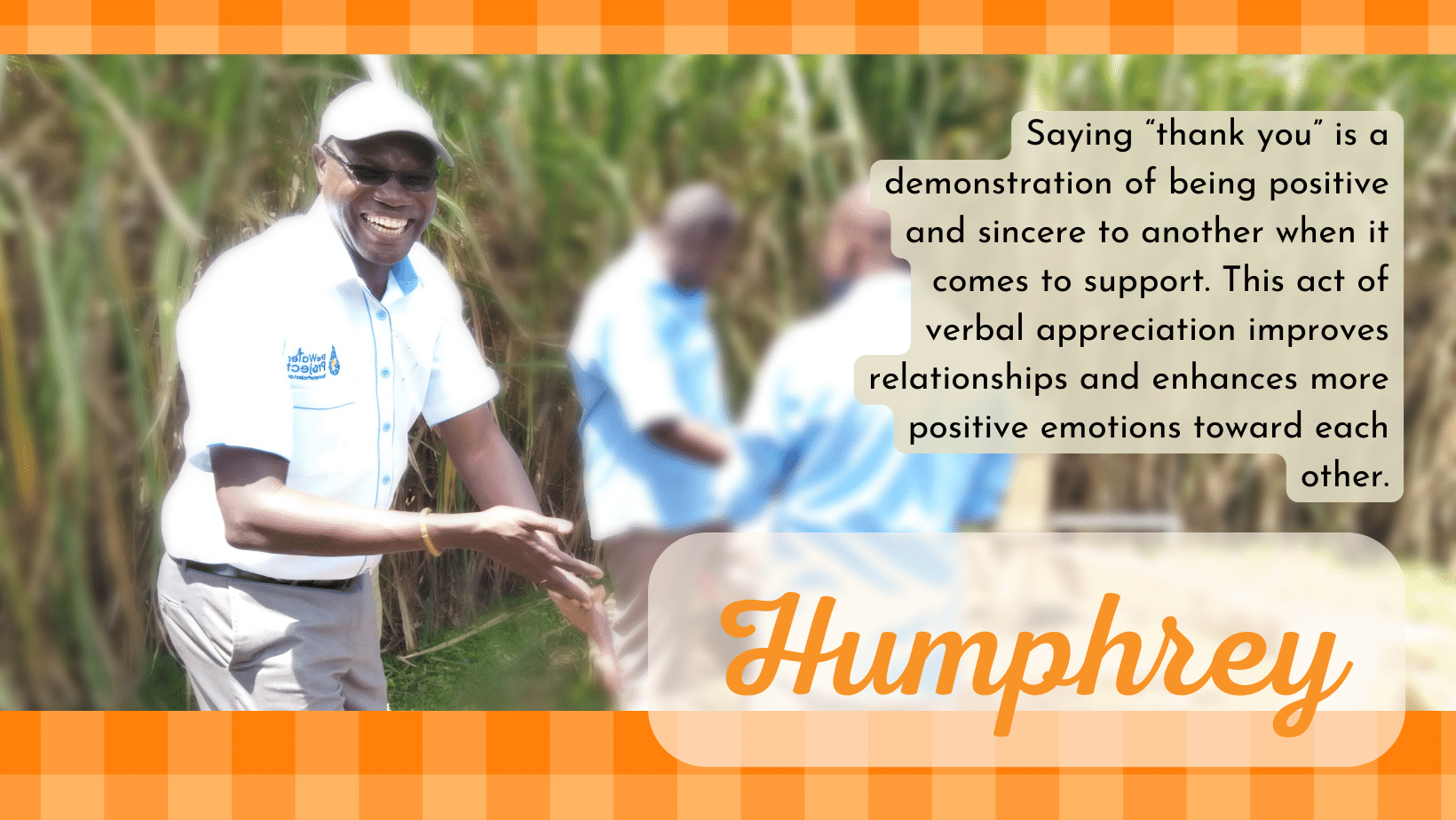
Catherine: This phrase is still relevant, and it is very important. The book Psalms 92 says it is good to give thanks to the Lord. The question is, why? It is because what God has done in our lives is beyond our imagination, and you cannot repay [Him]. So the word “thank you” is an expression from the heart.
Emmah: It’s still very relevant. People have gotten accustomed to it, and they use it more often than expected.
Humphrey: This phrase is still relevant today, and it has not become another base word to please each other because saying “thank you” is a demonstration of being positive and sincere to another when it comes to support. This act of verbal appreciation improves relationships and enhances more positive emotions toward each other.
The phrase “thank you,” in my opinion, shows a great sign of respect for another person and an expression of inner happiness from the community or school that has received a gift of water.
Spencer: We get to create the relevance in any expression of gratitude. Any words we use are relevant within the context of the relationship in which they are communicated. If we use an expression of gratitude in a relationship that is purely transactional or utilitarian, the phrase will carry no greater weight than the value that is communicated within the broader relationship. However, we have the opportunity for phrases like “thank you” to be a regular validation of work toward a shared goal or of a gift that brings us closer to the community and relationships, and world that we want to build together.
In our work, who do you find yourself thanking most often? Donors, community members, staff/colleagues?
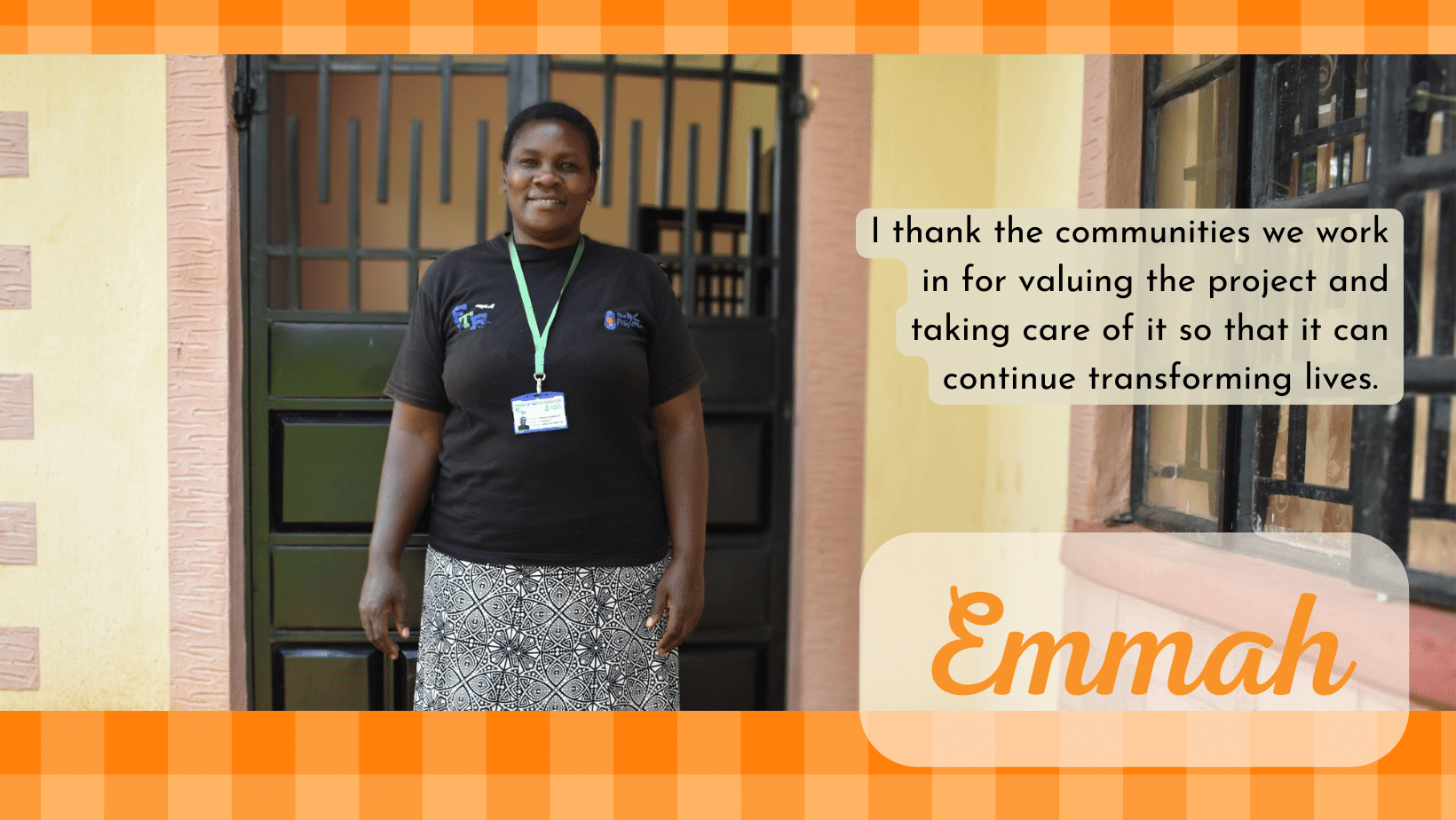
Catherine: In our work, I find myself thanking our donors most often. This is because they enable an activity to happen. If we remove donors from the equation and the need exists, then the status quo remains. The contribution of the community members and the staff cannot also be ignored.
Emmah: In our work, I find myself thanking the staff at The Water Project and my colleagues. They spent a lot of time making it happen. For my colleagues, they are champions of WASH (water, sanitation, and hygiene). I thank them for their positive energy towards achieving the TWP goal of 100% saturation coverage in our program area (Mumias East).
For the donors, I thank them for accepting to solve the problems of water in Western Kenya and putting a smile on our communities by mobilizing resources, which are then used to offer safe and clean water. I thank the communities we work in for valuing the project and taking care of it so that it can continue transforming lives.
Humphrey: Donors, community members, [and] staff/colleagues because, in the first place, we see the commodity given to us. “Water” is something that, once you get it, it makes life more simple. It unlocks other potentials.
Left on our own without TWP support, the development of water points in the region would be an impossibility. This is because clean water means so many things: health, education, and overall prosperity.
We know that clean water is an essential thing in life because, without water, our lives are incomplete. Clean water access by TWP makes many of us escape from diseases that can be caused by dirty water, the reason for our often thanks to TWP.
Spencer: We often talk about our work with the metaphor of a table. The work that we are doing requires the collaboration and involvement of donors, community members, colleagues, and our network partners- everyone has a seat at the table. To provide thanks for the contributions of one seat at the table is often a communication and recognition of thanks to people at each seat. The best gifts are the ones that don’t end in possession, but in the inspiration to share and give other gifts.
In my position, I see the sacrifices that staff and our network partners make with time, effort, and attention. My desire is to express gratitude in some form in almost every interaction. I trust that everyone on this team is committed to something that benefits a greater good than themselves, and for that, I am thankful. They inspire me to push harder, to give more. I rarely have the opportunity to thank donors aside from those I am most closely connected to, but their generosity is key to creating sustainable clean water access for hundreds of thousands of people, and for the part I get to play on this team.
Tess: I have the incredible privilege of speaking with many of our supporters, and the words thank you are constantly on my lips. It’s a joy to express gratitude to someone who has just made a choice to be generous, particularly when that generosity is aimed at lifting the burden of someone who is struggling. The thank you’s I share are not just from me personally – I simply get to be the happy messenger. Each time I’m with a community member who is telling me about the clean water they now have, I see the joy in their eyes. One woman, in particular, grabbed my heart as she expressed how she felt. With glistening eyes and hands on my shoulders, pulling me just a bit closer in, she said, “I don’t understand why someone I don’t know would care and want to help me. Please tell them thank you!” Those words were filled with heartfelt emotion.
I get to carry this message back to our incredible community of supporters. I often want to find better words, a bigger gratitude-container than just the little words “thank you.” But then I recall the expressions on the faces of those who have said it to me and know that these two words, thank you, are not little at all. They are universal. They say “I noticed.” They say what you did mattered. They are not small words at all. They are words that bridge thousands of miles, and also across a room.
Try it today. Approach each encounter you have with an attitude of gratitude. See if it doesn’t bless others, and also blesses you!
Is it necessary for the communities we serve to say “thank you” for every water point installed?
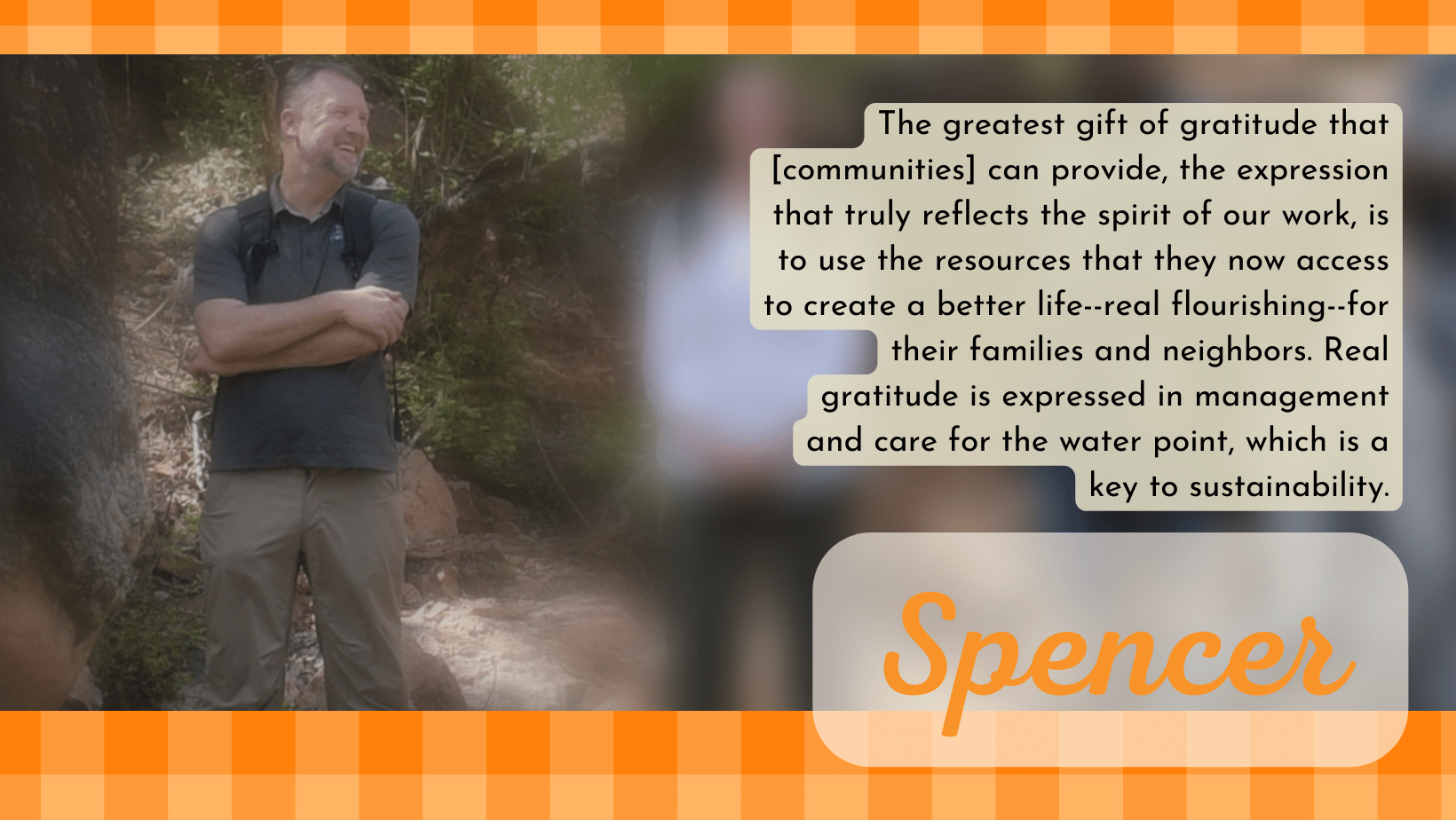
Catherine: Yes, it is necessary for the community members to say thank you for every water point we installed. This is because it makes them feel good as well. The people I know and [have] worked with them for some time…will feel disappointed if they don’t say thank you. This is not because someone is forcing them, but [because] they feel [it] necessary.
Emmah: Yes, it is very necessary, because it will is a sign of showing appreciation for the project.
Humphrey: Truth be told, when water points have been developed for communities we serve, they find themselves saying “thank you” from deep down their hearts because that water enables them (the entire community) to transition from struggling to thriving, all because of access to lasting clean water. Their children, in [a] healthy state, stay in school. Conflicts at the water points are reduced, and parents find themselves easily providing for their families: the reason for saying “thank you.”
It is necessary for the communities we serve to say “thank you” for every water point installed because clean water provided for them nourishes their bodies daily and allows them to live healthy lives. It allows them to cook food to feed their families, and water their livestock.
Spencer: I have a hard time thinking about saying “thank you” as a necessity. Words create worlds and words reflect worlds. The communities put in work and resources to access something necessary for life. We do not see the burden that so many people in rural Africa bear in order to get enough water for the day. The greatest gift of gratitude that they can provide, the expression that truly reflects the spirit of our work, is to use the resources that they now access to create a better life- real flourishing- for their families and neighbors. Real gratitude is expressed in management and care for the water point, which is a key to sustainability. That is the kind of response that recognizes that the water, sanitation, and hygiene resources are not a gift from one person, entity, or organization, but a gift to be treasured, cared for, and shared. That is the world we are trying to build and live into.
How does being thanked make you feel?
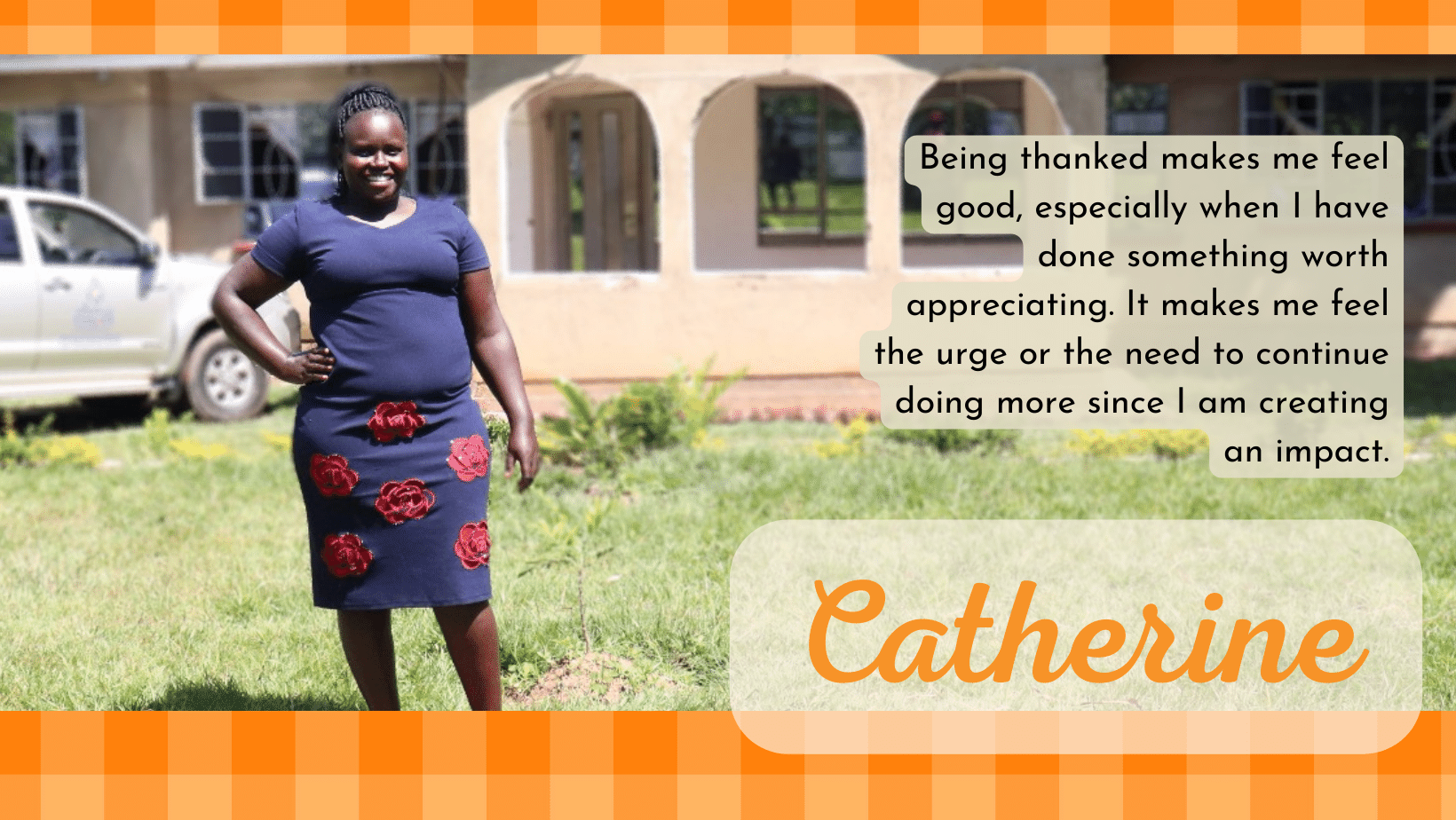
Catherine: Being thanked makes me feel good, especially when I have done something worth appreciating. It makes me feel the urge or the need to continue doing more since I am creating an impact.
Emmah: I feel great!
Humphrey: Being thanked makes me feel good. Not only does it make me feel good, but it also helps me build trust and a closer bond with the one who has thanked me.
Spencer: When it is authentic, it feels wonderful. When it is an affirmation of a strong relationship, it is life-giving. It communicates that we have shared life together, and that I have contributed in a positive way. There are few things that affirm dignity for me more than a true expression of thanks- it is a value statement. It is a statement that says, “I see you.”
We at The Water Project, as we continue sitting around our table, are thankful for everyone who helps make clean water happen for those who need it most. And if you’re reading this, we’re grateful for you, too. Thank you for any and all of your contributions, past and future. We’re looking forward to feeling grateful with you for many years to come.
Home More Like ThisTweet